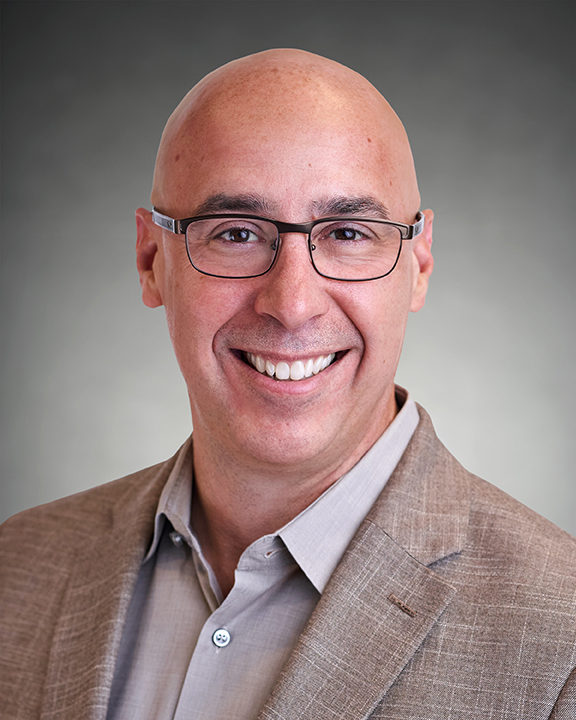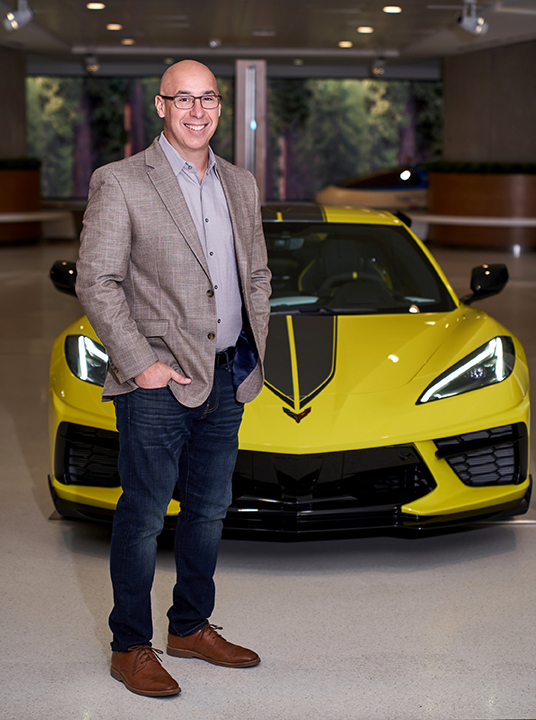Jeff Morrison, MBA '05: How Michigan Ross Opened the Door to a New World in the Automotive Industry

As the new vice president of global purchasing and supply chain for General Motors, Jeff Morrison, MBA ’05, works to solve some of the major challenges facing the automotive industry.

Morrison oversees close to $80 billion in direct material spending and is charged with procuring the materials needed for GM to build its electric, hydrogen fuel cell, and internal combustion engine vehicles. He’s also responsible for the requisite supply chain management of those materials, which means managing global relations, logistics, and more.
In the short time since his promotion, Morrison has already faced several significant challenges. His first day in his new role was April 1, which coincided with the implementation of COVID-19 health and safety lockdowns in Shanghai that impacted production at automotive suppliers for more than a month.
The industry is also still recovering from the semiconductor chip shortage caused by the pandemic, as well as many other recent discrete interruptions to the global supply chain. Additional disruptions include COVID-19-related supplier shutdowns and production restrictions in Southeast Asia, severe winter storms temporarily closing down auto manufactures in Texas, and the Canadian truck driver protest which obstructed the Ambassador Bridge between the United States and Canada for several days.
Also Russia’s invasion of Ukraine has caused the price of nickel, and other materials vital to electric vehicle production, to soar.
For all of the challenges Morrison has faced, he’s well-equipped to help GM navigate through this unprecedented period. But 25 years ago, Morrison was on a very different career path within the automotive industry.
Career pivot
In 1995, Morrison graduated from the University of Michigan-Dearborn with a degree in mechanical engineering. He worked at Daimler Chrysler shortly after graduation, but found that as his career ascended, his responsibilities had less to do with engineering and more to do with project management, as well as the oversight of more than a dozen automotive suppliers.
“I always tell people I speak engineering, which I think helps you in a technical field,” he said. “But I realized that business was a much bigger interest for me, and it was actually something that I was a lot better at.”
He took a job as an engineering manager at Federal-Mogul in late 2000, his first step toward a career pivot. Around this time, Morrison began his research into several MBA programs and found his ideal fit in Ann Arbor.
In 2002, Morrison enrolled in Michigan Ross’ Evening MBA Program. During the day, he continued to work at Federal-Mogul and commuted from his office in Southfield to Ann Arbor. His courses employed a case-based curriculum and he quickly grasped subjects like business strategy, marketing, and finance, all of which were previously foreign to him.
“Each course gave me a different perspective on business topics and how to frame and look beyond the obvious issues and to try to see bigger challenges,” Morrison said. “Then I’d go to work the next day after class and found that I really liked what I learned the night before. I was actually really excited to talk about it. I often felt there was a piece of it that I could apply to my work, almost on a daily basis.”
Near the end of his time at Ross, Morrison accepted a position as an associate with Ricardo Strategic Consulting, an engineering consulting company. He was assigned to work on a project with GM, and in a little over a year, he transitioned to GM full time as a global commodity manager.
Rising through the ranks

Morrison has worked at GM for 16 years in a wide range of positions with varying responsibilities. Over that time, he’s helped facilitate several mergers and acquisitions and other strategic decisions to push GM forward. This includes working as the business lead on a joint venture with LG Energy Solution to produce battery cells for electric vehicles.
Now as vice president of global purchasing and supply chain, Morrison credits Michigan Ross with how well his accounting and finance coursework prepared him for the various stages of his career.
“There are times where I've met with CFOs of financially troubled companies,” Morrison said, “and really felt like I can talk income statements and balance sheets on equal footing or better.”
His Michigan Ross education also taught him to see beyond the numbers, process the bigger picture, evaluate the market as a whole, and strategize accordingly.
Morrison has found these skills to be especially helpful when working with global GM partners that are still recovering from COVID-related slowdowns, product shortages, inflation, and more. He’s able to figure out the best way to support suppliers and other partners while adequately assessing the risks involved.
My time at Ross shaped who I am. It shaped how I think. It shaped the capabilities that I have. If I combine that with the background I had before, I really think it’s accelerated me through the last 15 years.
Continuing education through Michigan Ross
Morrison’s business education with Michigan Ross didn’t end after graduation. Four years ago, Morrison took a GM-sponsored class on leading with impact that was offered at Ross. The week-long executive residency reinforced many of the lessons he learned as an MBA student, but included a focus on design thinking, a problem-solving approach that he’s found quite useful.
“What we see at GM a lot is that a problem will present itself and people tend to just leap right to a solution versus really asking enough questions about what's driving the problem.” Morrison said, noting how the course helped him to take a more thoughtful approach to problem solving.
Moreover, the course was centered on leadership and fostering a positive culture, something that Morrison has found especially useful now that he has a global team of more than 2,500 people operating under his purview.
“The course is something we've put a lot of our executive leaders through, and I thought it was a great class.”
A stand-out MBA Program
Looking back on the trajectory of his career, Morrison is thankful that he chose to pursue his MBA at Michigan Ross. He often encourages GM colleagues and mentees interested in an MBA to look into Ross, because he believes his return on the time and money he invested in his education has paid off a thousandfold.
If you want to check a box and say that you have an MBA degree on your resume, there's probably a lot of other options. But if you really want something that can propel your life and goals, go to Ross.







